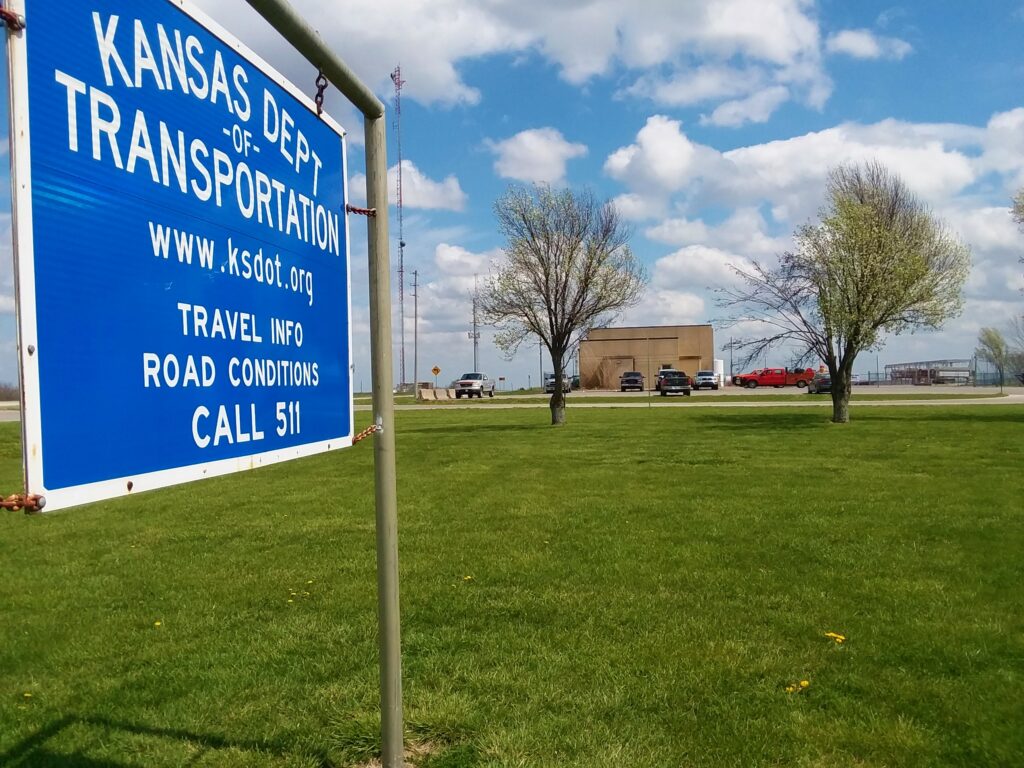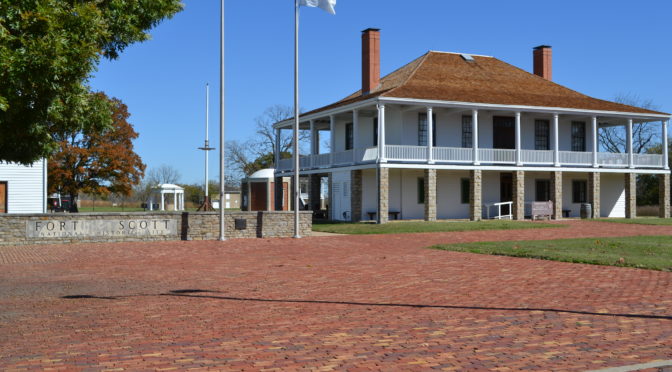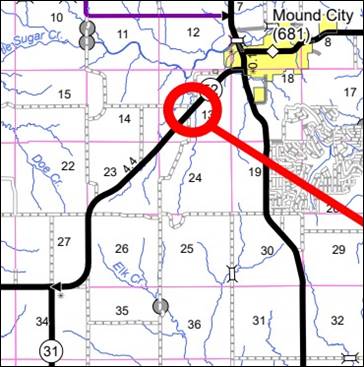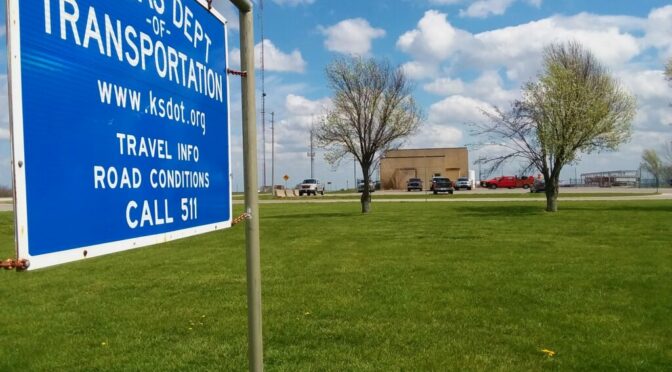|
Category Archives: Kansas
Fort Scott Get $1.5 Million For U.S. Hwy. 54
Governor Laura Kelly Announces 34 Cities
Across Kansas to Receive $28M
for Local Highway Improvements
FORT SCOTT – Governor Laura Kelly announced today that 34 cities across Kansas have been selected to receive a total of $28.65 million for improvements to the State Highway System located within city boundaries. The funds will be directed to preserve and improve pavement, add turn lanes, and modify intersections along essential roadways in both rural and urban areas throughout the state.
The grants are administered through the Kansas Department of Transportation’s City Connecting Link Improvement Program (CCLIP). The program is an important component of the state’s bipartisan transportation program, IKE, passed under the Kelly Administration.
“By making this investment, we’re improving the safety and accessibility of Kansas roadways that are local centers of community life,” Governor Laura Kelly said. “Through these grants, we’re delivering economic opportunities throughout rural and urban Kansas.”
Governor Kelly and Transportation Secretary Julie Lorenz announced the CCLIP awards in Fort Scott, where $1.5 million in CCLIP funds will be directed to improvements on U.S. 54, also known as Wall Street.
KDOT was able to increase CCLIP funding level for this selection cycle by more than $10 million over previous years due to additional federal funds coming to Kansas as part of the Bipartisan Infrastructure Legislation (BIL). Both federal and state funds are designated for the CCLIP program and local matching funds are required based on city population.
“With the Connecting Link program, KDOT partners with communities to find solutions to support local transportation priorities,” Transportation Secretary Lorenz said. “I very much appreciate the power of the state and communities pooling funds to make improvements.”
A City Connecting Link is defined as any routing of the State Highway System located with the corporate limits of a city, not including the Interstate System. For this CCLIP cycle applying to state fiscal years 2024-2025, KDOT received 54 applications requesting $38 million.
There are three categories of CCLIP projects: Surface Preservation (SP), which extends the life of the driving surface; Pavement Restoration (PR), which rehabilitates or replaces pavement; and Geometric Improvement (GI), which addresses safety or capacity by improving roadway turn lanes, intersections, or modifying lane configurations.
For each project – the category, city, highway, and amount awarded include:
|
Category |
City |
Highway |
CCLIP Funds |
|
Northeast Kansas |
|||
|
SP |
Atchison |
US-59 |
$400,000 |
|
SP |
Bonner Springs |
K-32 |
$400,000 |
|
SP |
Emporia |
US-50 |
$400,000 |
|
SP |
Kansas City |
US-169 |
$400,000 |
|
SP |
Lawrence |
US-59 |
$400,000 |
|
PR |
Marysville |
US-77 |
$1,250,000 |
|
North Central Kansas |
|||
|
SP |
Clay Center |
K-15 |
$400,000 |
|
SP |
Concordia |
K-9 |
$400,000 |
|
PR |
Herington |
US-56B |
$1,250,000 |
|
PR |
Moundridge |
K-260 |
$800,000 |
|
PR |
White City |
K-4 |
$1,250,000 |
|
Northwest Kansas |
|||
|
SP |
Colby |
K-25 |
$400,000 |
|
PR |
Smith Center |
K-204 |
$1,300,000 |
|
PR |
Smith Center |
K-204 |
$1,300,000 |
|
PR |
Stockton |
US-24 |
$1,100,000 |
|
Southeast Kansas |
|||
|
PR |
Baxter Springs |
US-69A |
$1,000,000 |
|
GI |
Fort Scott |
US-54 |
$1,500,000 |
|
SP |
Independence |
US-160 |
$400,000 |
|
SP |
Independence |
US-160 |
$400,000 |
|
GI |
Madison |
K-58 |
$1,500,000 |
|
PR |
Parsons |
US-59 |
$1,250,000 |
|
South Central Kansas |
|||
|
PR |
Anthony |
K-44 |
$900,000 |
|
SP |
El Dorado |
US-77 |
$400,000 |
|
SP |
Great Bend |
US-281/US-56 |
$400,000 |
|
PR |
Hoisington |
K-4 |
$1,250,000 |
|
PR |
Kingman |
US-54 |
$1,250,000 |
|
SP |
Larned |
US-56 |
$400,000 |
|
PR |
Pratt |
US-281 |
$750,000 |
|
PR |
Wellington |
US-81 |
$1,250,000 |
|
SP |
Winfield |
US-160 |
$400,000 |
|
Southwest Kansas |
|||
|
SP |
Dodge City |
US-50 |
$400,000 |
|
PR |
Lakin |
K-25 |
$1,250,000 |
|
PR |
Ness City |
K-96 |
$1,000,000 |
|
GI |
Ulysses |
US-160 |
$1,500,000 |
|
TOTAL: |
$28,650,000 |
Governor Kelly In Fort Scott Oct. 12 For a Transportation Announcement
Governor Laura Kelly will join the Kansas Department of Transportation in Fort Scott on Wednesday to announce funding for multiple transportation projects happening throughout the state.
She along with Transportation Secretary Julie Lorenz will be at Fort Scott National Historic Site at 11 a.m. on Oct. 12 to make the announcement.
Survey to begin on K-52
Survey to begin on K-52
The Kansas Department of Transportation (KDOT) plans to start a survey at the Little Sugar Creek drainage culvert on K-52 in Linn County the week of Oct. 17. The culvert is approximately 1 mile west of the K-7/K-52 junction (see map).
The survey area of 2,500 feet is based on the existing alignment. Survey crew members will gather information for a future culvert replacement project. KDOT expects the survey to be complete by Dec. 30.
Activities include the use of survey instruments on the ground to determine locations of existing features within the corridor. A member of the survey crew will contact property owners or tenants for permission to enter private property. John Lilak of Bartlett & West will manage the survey for KDOT. Persons with questions may contact KDOT Public Affairs Manager Priscilla Petersen, (620) 902-6433.
KanDrive App now available on cell phones
|
|
|
Governor Kelly in Fort Scott at KDOT on Oct. 12

Governor Laura Kelly to Announce Transportation Project Funding in Fort Scott on Wednesday
TOPEKA – Governor Laura Kelly will join the Kansas Department of Transportation in Fort Scott on Wednesday to announce funding for multiple transportation projects happening throughout the state.
Who: Governor Laura Kelly, Transportation Secretary Julie Lorenz
What: Transportation Grant Announcement
When: 11:00 a.m.; Wednesday, October 12, 2022
KS Sports Betting Generates $1.3 Million Dollars Since Sept. 1
Governor Laura Kelly Announces Kansas Sports Wagering is Off to a Winning Start
~~In One Month, Sports Wagering Generates $1.3M in Total Revenue,
$130k for State~~
TOPEKA – Governor Laura Kelly today announced that in the single month that sports wagering has been legal, it has generated a total of $1.3 million in revenue, including nearly $130,000 for the State of Kansas.
“These revenues reinforce what we already knew: Legal sports betting is a common-sense solution that keeps Kansans’ money in Kansas and supports Kansas businesses,” Governor Laura Kelly said. “While legal wagering is just in its infancy, these revenues will continue to grow and benefit the state over time.”
On May 12, 2022, Governor Laura Kelly signed Senate Bill 84, bipartisan legislation making it legal to wager on sports at casinos, on digital platforms, and other venues in Kansas. Sportsbooks opened in record time on September 1, with Governor Kelly placing the first legal bet.
“Sports betting has successfully kicked off in Kansas, and players could not be more excited to get in on the action,” Stephen Durrell, Executive Director of the Kansas Lottery, said. “The launch went smoothly thanks to the efforts of our casino partners, the sports wagering platforms, the KRGC, and our staff at the Kansas Lottery. We will continue to work to make sports betting in Kansas safe, secure, and fun for all players as we expand and grow.”
|
Sports Wagering Revenues |
|||
|
Casino Facility |
Platforms |
Revenues |
State Share |
|
Kansas Star |
FanDuel |
$207,722 |
$20,772 |
|
Hollywood |
Barstool Sports |
$762,305 |
$76,230 |
|
Kansas Crossing |
BetMGM, Caesar’s, PointsBet |
$326,147 |
$32,615 |
|
Boot Hill |
DraftKings |
$ – |
$ – |
|
Totals |
$1,296,174 |
$129,617 |
|
Revenues reported by the Kansas Lottery are from settled and completed bets and don’t account for ‘future wagers’ placed like the Super Bowl, World Series, or MVP awards. Facilities or platforms presenting a zero-revenue are due to promotional play and player acquisition, in which those platform providers are responsible for payment until there is net positive revenue.
Highly Pathogenic Avian Influenza (HPAI) Returns to Kansas
MANHATTAN, Kansas — Fall has brought a resurgence of highly pathogenic avian influenza (HPAI) nationwide, and this week the Kansas Department of Agriculture identified HPAI in two Kansas counties: Johnson County and Neosho County.
Both new HPAI locations are in non-commercial mixed species flocks, and KDA is working closely with USDA–APHIS on a joint incident response. KDA officials quarantined the affected premises, and birds on both properties will be depopulated to prevent the spread of the disease.
Anyone involved with poultry production from the small backyard chicken owner to the large commercial producer should review their biosecurity activities to assure the health of their birds. Find guidance on biosecurity on the KDA Division of Animal Health webpage at agriculture.ks.gov/
Highly pathogenic avian influenza is a highly contagious viral disease that can infect chickens, turkeys and other birds and can cause severe illness and/or sudden death in infected birds. This outbreak has seen illness and mortality in a wider scope of bird species than past outbreaks, including wild and domestic waterfowl. Attentively monitor your birds for symptoms of HPAI which include: coughing, sneezing, nasal discharge, and other signs of respiratory distress; lack of energy and appetite; decreased water consumption; decreased egg production and/or soft-shelled, misshapen eggs; incoordination; and diarrhea. Avian influenza can also cause sudden death in birds even if they aren’t showing other symptoms.
If these symptoms are observed in your birds, immediately contact your veterinarian. If you don’t have a regular veterinarian, contact KDA’s Division of Animal Health office toll-free at 833-765-2006.
According to the U.S. Centers for Disease Control and Prevention, the recent HPAI detections do not present an immediate public health concern. Birds and eggs from the infected flock will not enter the food system. As a reminder, the proper handling and cooking of all poultry and eggs to an internal temperature of 165 ˚F is recommended as a general food safety precaution.
As part of existing avian influenza response plans, federal and state partners are working jointly on additional surveillance and testing in areas around the affected flocks. The United States has the strongest avian influenza surveillance program in the world, and USDA is working with its partners to actively look for the disease in commercial poultry operations and live bird markets and in migratory wild bird populations.
For more information about HPAI, including current status of the confirmed cases in other states as well as more information about biosecurity for your flock, go to KDA’s avian influenza webpage at agriculture.ks.gov/
Wildfire Task Force to Meet October 12
MANHATTAN, Kansas — The Governor’s Wildfire Task Force will meet on Wednesday,
October 12, from 10:00 a.m. to 3:00 p.m. at the Kansas Regional Training Institute, 2929
Scanlan Avenue in Salina.
The meeting is open to the public and will discuss recommendations for how federal, state,
and local officials, along with Kansas communities, can better prevent, respond to, and
recover from wildfires. A Zoom link can be available upon request. Due to space
limitations, guests are asked to RSVP to Brittney Grother at [email protected] or
785-564-6797 by Tuesday, October 11. Persons who require special accommodations must
make their needs known at least two days prior to the meeting.
Bourbon County Is In a Drought Emergency
Governor Updates Declaration of Drought Emergency, Warnings and Watches for Kansas Counties
The Governor’s Drought Response Team examines conditions; and recommends updates to the Governor
Governor Laura Kelly has approved updated drought declarations for Kansas counties with Executive Order #22-08. This drought declaration continues to keep all 105 Kansas counties either in watch, warning or emergency status.
“Much of Kansas continues to experience severe drought conditions which have impacted the daily lives of Kansans through our hot and dry summer months,” said Governor Kelly. “As these conditions are forecast to persist or worsen over the foreseeable future, I strongly encourage all Kansans to be mindful of ways we can conserve water and minimize fire hazards.”
The drought declaration placed 67 counties into an emergency status, 11 counties in a warning status and 27 into a watch status. This action was recommended by Connie Owen, Director of the Kansas Water Office and Chair of the Governor’s Drought Response Team. Much of Kansas has experienced above normal temperatures dating back to the previous April, with precipitation averaging well below normal for many of those same locations over that same timeframe. In some parts of Kansas these precipitation deficit conditions have existed since the latter part of 2021. The outlooks from now through December favor above-normal temperatures and below-normal precipitation for nearly all portions of Kansas, meaning drought conditions could persist and expand over the next several months.
“The current drought conditions impacting much of Kansas have stressed surface and groundwater supplies, negatively impacted crop production, and led to elevated wildfire risk in many areas,” said Owen. “The Governor’s Drought Response Team will continue to be diligent in the monitoring of drought conditions across Kansas and make future drought recommendations to Governor Kelly as conditions change. With outlooks continuing to call for challenging conditions into the winter months, the need for continued drought awareness and action across Kansas is essential.”
Through an interagency agreement between the Kansas Water Office, Kansas Department of Wildlife and Parks and Kansas Division of Emergency Management, counties in emergency stage are eligible for emergency use of water from certain state fishing lakes. These counties also become eligible for water in some federal reservoirs.
Individuals and communities need to contact the Kansas Water Office for a water supply request prior to any withdrawals from lakes. These requests will in turn be referred to the appropriate office to obtain necessary permits to withdraw requested water.
This Executive Order shall remain in effect for those counties so identified until rescinded by Executive Order ending the declaration or revising the drought stage status of the affected counties.
Effective immediately, Executive Order #22-08:
- Declares a Drought Emergency, Warning or Watch for the counties as identified below;
- Authorizes and directs all agencies under the jurisdiction of the Governor to implement the appropriate watch, warning or emergency level drought response actions assigned in the Operations Plan of the Governor’s Drought Response Team.
The Governor’s Drought Response Team will continue to watch the situation closely and work to minimize the negative drought-induced effects on Kansans.
For more detailed information about current conditions, visit the Climate and Drought webpage on the Kansas Water Office website at kwo.ks.gov.
County Drought Stage Declarations:
Drought Emergency: Allen, Barber, Barton, Bourbon, Butler, Chautauqua, Cherokee, Cheyenne, Clark, Comanche, Cowley, Crawford, Decatur, Edwards, Elk, Ellis, Ellsworth, Finney, Ford, Gove, Graham, Grant, Gray, Greeley, Greenwood, Hamilton, Harper, Harvey, Haskell, Hodgeman, Kearny, Kingman, Kiowa, Labette, Lane, Logan, McPherson, Meade, Montgomery, Morton, Neosho, Ness, Norton, Pawnee, Phillips, Pratt, Rawlins, Reno, Rice, Rooks, Rush, Russell, Scott, Sedgwick, Seward, Sheridan, Sherman, Stafford, Stanton, Stevens, Sumner, Thomas, Trego, Wallace, Wichita, Wilson, and Woodson.
Drought Warning: Anderson, Chase, Coffey, Lincoln, Linn, Lyon, Marion, Morris, Osborne, Saline and Smith.
Drought Watch: Atchison, Brown, Clay, Cloud, Dickinson, Doniphan, Douglas, Franklin, Geary, Jackson, Jefferson, Jewell, Johnson, Leavenworth, Marshall, Miami, Mitchell, Nemaha, Osage, Ottawa, Pottawatomie, Republic, Riley, Shawnee, Wabaunsee, Washington, and Wyandotte.
# # #
Scholarships Available for KS Students Enrolled in Transportation Classes
|
|
|
Evergy To Explain Dramatic Increase in Spending Plan on Dec. 13
KCC schedules public workshop for Evergy to explain dramatic increase in capital spending plan
TOPEKA – The Kansas Corporation Commission (KCC) has scheduled a workshop on December 13 at 9:30 a.m. to give Evergy officials an opportunity to explain a dramatic increase in the company’s capital expenditure projections. The plan, filed earlier this year, showed an increase of $1.2 billion compared to projections shared when the company presented its Sustainability Transformation Plan (STP) last year.
In an order issued on September 15, the Commission directed Evergy to work with KCC staff and the Citizens Utility Ratepayer Board (CURB) to schedule the workshop, which will be conducted by Zoom and available for public viewing on the Commission’s YouTube channel. The workshop will also be recorded for later viewing.
During the workshop, Evergy will be asked to explain the necessity and impact of the proposed capital spending and answer questions from KCC Commissioners, Commission Staff and CURB. Prior to the workshop, Evergy is required to file updated and comprehensive financial modeling showing expected retail rate changes resulting from continued increases in capital expenditures. That information must be submitted by December 2.
Evergy is required to file a Capital Investment Plan with the KCC annually. A report filed by Commission Staff in response to the 2022 report expressed concern that the expenditures outlined exceeded those reported in the STP by 21.82%. The 2022 five-year Capital Investment plan was $1 billion higher than the 2021 five-year plan, and this increased spending projection was on top of a previously announced $1 billion increase between Evergy’s 2020 and 2021 five-year plan.
The order is available here.
A recording of the Business Meeting is available on the KCC YouTube channel.



